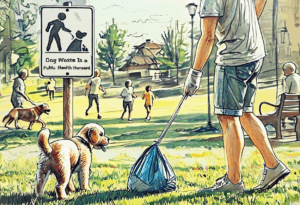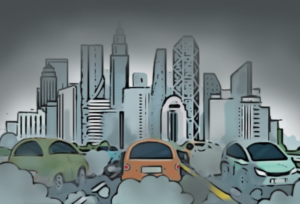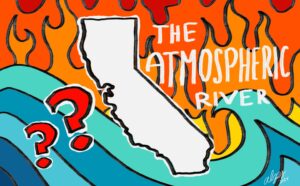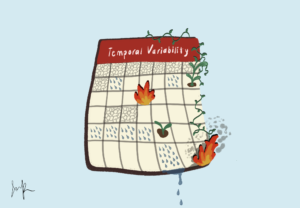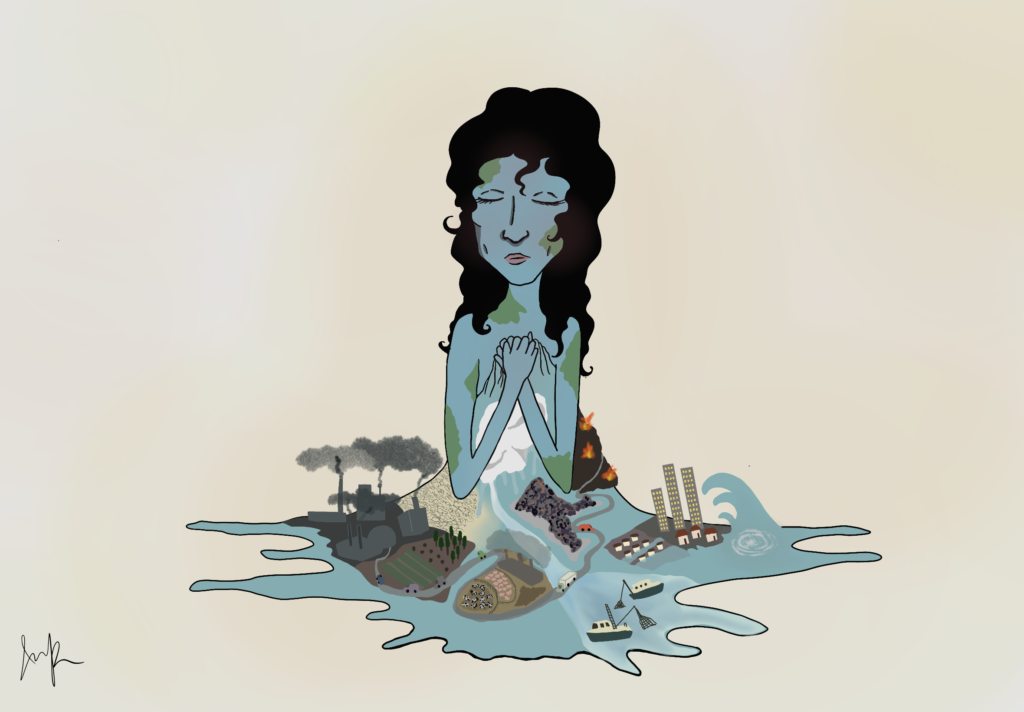
By Daniella Parkinson
Some may describe climate change as a finish line looming at the peak of the horizon, readily approaching in our surge towards it, but securely confined behind the taut ribbon that, only once broken, indicates the immediate sweeping doom of humanity. Others may describe climate change as a precarious hive, festering with venomous bees and continuously prodded with the stick of human recklessness until the weakening honeycombs give way to untameable swarms of disaster. However, although well intended, such conceptions of climate change fail to consider its all-consuming and ever-present nature, deeply entrenched in every part of our everyday life – a thickening fog that looms above the Earth, submerging us yet simultaneously blinding us of its depth with its multidirectional haze. Climate change is perpetual and pervasive, a series of acute disasters as opposed to a far-off finish line, and the failure to recognize the current existence of climate change is the failure to heal from the consequences from which we already suffer.

Always a hot-button issue in politics, global warming has been recognized as a controversial and divisive topic looming at the forefront of public attention for far too long, a problem almost too slippery and too contentious to ever show promise of reaching a solution. A major cause for the cautious overstep of climate issues is the belief of its silent distance, a fairytale villain lurking behind a page-turn that we can hide from if we simply close the storybook, an unseen wound progressing into an untreated scar. However, climate change has quickly come to dominate every aspect of our every day, even when unacknowledged, continuing to beat its brass drum across history as it mutedly unfurls and manifests in symptoms unrecognized and thus too quickly dismissed. In my home state of Maryland, over one million people fell ill to the continuously spreading coronavirus, approximately one-sixth of the entire population. Though recognized as a startling tragedy, it is one shaken cleanly from the public’s hands, brushed off as a concern entirely beyond control, and considered neatly resolved and tied up in a bow by time. However, the coronavirus, as well as recently budding viruses still spreading rampantly across the globe, are emboldened in part by climate change and our contribution to it.
Diseases often originate from deforestation, a major pillar of the climate crisis, which results in habitat loss and, thus, the unnatural dispersion of animals seeking newly lacking necessities for survival.
Displaced animals may find food and water closer to where people are, forging unnatural overlaps of disease-bearing wild species and formerly sheltered human communities, with rapid developments in speedy transportation and overpopulation only increasing the spread of the foreign viruses to which we are now greatly exposed. Such an instance was the case for the Ebola epidemic, piercing its claws into West Africa following the relocation of a disease-bearing bat population in human-inhabited areas while seeking shelter upon the deforestation of their homes. Furthermore, the increase of pollution, another teetering pillar of climate change, greatly contributes to the viral spread of respiratory diseases, such as COVID-19. As fossil fuel emissions increase as a result of persistently reckless industrialization and contaminate the air we breathe, we are rendered far more vulnerable to respiratory diseases such as the coronavirus, accelerating its spread and contributing to the large numbers of infected people in my community and the globe. While pollution impacts every sector of planet Earth, one cannot deny its discriminatory scope, clustering in urban cities and remaining untreated in underfunded localities, therefore greatly increased susceptibility to viruses and further detrimental impacts of climate change in the marginalized communities that often inhabit these areas.
Despite its intersectional breadth, the topic of climate change has been fruitlessly tossed back and forth in politics like a feverish eternal round of ping pong, and while advocating for sweeping solutions to address the root of the problem remains highly important, we must not forget to tend to the noxious branches that stem from its untamed origin. As contention in the courts remains steadfast, rising water levels continue to uproot underfunded communities whose homes could not withstand the weight of flood, droughts squelch the American south and provoke the invasion and destruction of local indigenous communities for resources, wildfires rage across the continent, displacing majorly the lower class, people of color, and women, and the coronavirus and further diseases swarm the globe, endangering people of all socioeconomic statuses in united helplessness. As such, our solutions must involve nipping climate change in the bud but cannot, especially in our current gridlock, distract from prioritizing the safety and well-being of global citizens. Alongside efforts of resistance must come acts of recovery – advocating for increased funding towards low-income communities and eliminating human displacement, protecting indigenous regions while adequately allocating resources in states of environmental emergency, and supporting legislative acts to improve healthcare and provide basic necessities such as vaccines and medication for those in need.
Understanding those who suffer the effects of climate change beyond the United States border must also persist. As America celebrates the overcoming of mask mandates and a return to “normalcy,” sympathy and aid must be spared towards nations such as Yemen, which still heave beneath an 18% Covid mortality rate with only 1.5% of inhabitants acquiring access to vaccines. And even alternately, as America scrambles to secure the rights of women, injustice deserves just as much attention when persisting beyond our borders, as violence against women and women impoverishment, illiteracy, and workforce endangerment increase across the continent of Africa and throughout Latin America – limiting female mobility and thus causing further displacement and legislative abandonment once confronted with increased risk of climate crisis subjection for women, despite having historically contributed immensely to climate solutions. In such situations, confrontation of climate change head-on may not even be as effective as simply picking the pieces it has already left behind, for example, advocating for women’s rights to decrease the disproportionate amount of women rendered homeless as a result of climatic devastation, and encouraging women’s participation in STEM education to allow for the increase of climate change solutions. Doing so would not only offer aid to victims of climate crises but prevent the same forms of suffering by such marginalized groups in the future, indirectly aiding in the conquering of climate change. In our efforts to absolve environmental destruction, we must not forget, if possessed, our place of privilege above its past effects; despite our temporary, blissfully insulated positions above the thickening fog of climatic demolition, we must never abandon those of us who have only ever known the fog, who lives seeing only the past, present, and future destruction of climate change before them. Man cannot fight nature alone, but man can always help mankind.
Climate change awareness is just as pervasive as its visible consequences; the cracks in the Earth it leaves as the residue of its natural destruction similarly expose the cracks in our society. Climate change impacts anywhere from my small community to the entire span of the globe with not only its forceful imprint witnessed through tangible devastation but with its silent amplification of flaws already helplessly echoing in our social systems amidst unresolved injustice. For example, while acknowledging that climate change holds the globe in its palm, we must also recognize that it discriminates, constructing the Earth’s people in a metaphorical hierarchy where destruction trickles past those privileged upon peaks and slopes – temporarily shielded by sturdy homes, well-funded communities, and adequate healthcare – and pools at the bottom. Climate change is not a sentient being stapling a target to marginalized people’s backs; it merely follows the disproportionate flow of our own hierarchical systems and can only be alleviated in part by uplifting the communities already submerged in its wrath.
To save the Earth, we must first save its people. Climate change is deeply ingrained in every aspect of our everyday lives, determining our health, our safety, and our hope for the future. Dismissal of climate change and its deadly effects is the sacrifice of the already disparaged identities forming the foundation of the world: the lower- and middle-class, the immunocompromised or disabled people, the elderly, the children, the female population, the people of color; the heart and soul of America and planet Earth. Though we may always remain divided, whether, by political affiliation or values, by gender, race, or class, we are all united by our inhabitation of planet Earth. Like a rainbow array of Tic Tacs approaching the ravenous tongue of climate change, we are all eventually impacted, despite our differences, by the endangerment of our beloved planet and must work to protect its future. Beyond its temperamental tragedies and in its simplest form, no parent wants to raise their child in a world where their outdoor play is inhibited by poor air quality, and no citizen wants to return home unable to receive the pay they deserve due to economic crises following the resurgence of a viral disease, no elderly person wants to be told that they cannot say goodbye to their loved ones due to the climatic rebellion of the world they helped construct; no resident on planet Earth truly wishes to experience even the most seemingly minuscule consequences of climate change, and they do not deserve to. Environmental concerns are unique in their overlapping of the well-being of all global residents, climate change deeming humanity a dual victim and oppressor in the intersectional endangering of all people, and its multifaceted destruction epitomizing the shared human experience can only be tamed on a united front.
Rather than fearing the flood, we must stop the stream, and that begins by recognizing that climate change is a problem currently harming a select few but dooming a global totality. I am not defined by my residency in Montgomery County, nor am I by the state of Maryland or the East Coast, or even the entire nation of America. The vastness of my identity follows the expansion of my responsibility, the entire world being my beloved community as it is every other inhabitant, and thus ours to protect and conserve, both ecologically and socially.
So, yes. Plant a tree. Skip the plastic straws, separate out your recyclables, and carpool whenever possible. As climate change is a series of acute disasters, it must be resolved through a series of seemingly minuscule solutions. But to aid in the world’s true recovery, branch out your solutions to include those already impacted by climate crises and most vulnerable to future damages, no matter how small or local the gesture. Beyond simply, and unfortunately futilely, demanding federal elimination of climate change as a whole, cast your vote for solutions to local homelessness and impoverishment, stand proudly against the mining of national indigenous lands and advocate the uplifting of women in academia, and educate yourself and others on foreign affairs in the recovery from the still globally rampant coronavirus and further climate crippling tragedies. Doing so will not only contribute to the reduction of climate change’s consequences but bring light to the purely interconnected essence of environmental issues, encouraging understanding of the inherent relevance of climate change in all of our lives to drive our individual duties to overcome it in the salvation of the soul of our global community.
Earth is only as good as its inhabitants, and as such, climate change must not remain simply a planetary issue but a people issue.
Bhatia, Gurman, et al. “Yemen: The Latest Coronavirus Counts, Charts and Maps.” Reuters, Thomson Reuters, 15 July 2022,
https://graphics.reuters.com/world-coronavirus-tracker-and-maps/countries-and-territories/yemen/. “Coronavirus and Climate Change.” C-CHANGE | Harvard T.H. Chan School of Public Health, 6 July 2020, https://www.hsph.harvard.edu/c-change/subtopics/coronavirus-and-climate-change/. “Mortality Analyses.” Johns Hopkins Coronavirus Resource Center,
https://coronavirus.jhu.edu/data/mortality.
“Women…in the Shadow of Climate Change.” United Nations, United Nations,
https://www.un.org/en/chronicle/article/womenin-shadow-climate-change#:~:text=Women%20are%20inc reasingly%20being%20seen,dependent%20on%20threatened%20natural%20resources.
The views and opinions expressed are those of the authors and do not necessarily reflect nor represent the Earth Chronicles and its editorial board.

